
Full Body Health: Brain
A deep dive into brain health with nutritional and lifestyle tips


What is the brain?
The brain is a major organ located in the head below the skull. The brain controls every aspect of what we do, both conscious and unconscious. The brain is a wrinkled structure, kind of like a walnut, that is slightly grey in colour. The brain is made up of many different structures and lobes with their many different functions.
The largest part of the brain is the Cerebral Cortex. The Cerebral Cortex is the wrinkly part of the brain and makes up the largest surface area of the brain. This is typically what we think of when we think of the brain. The Cerebral Cortex is usually split up into different lobes or areas that perform different functions.
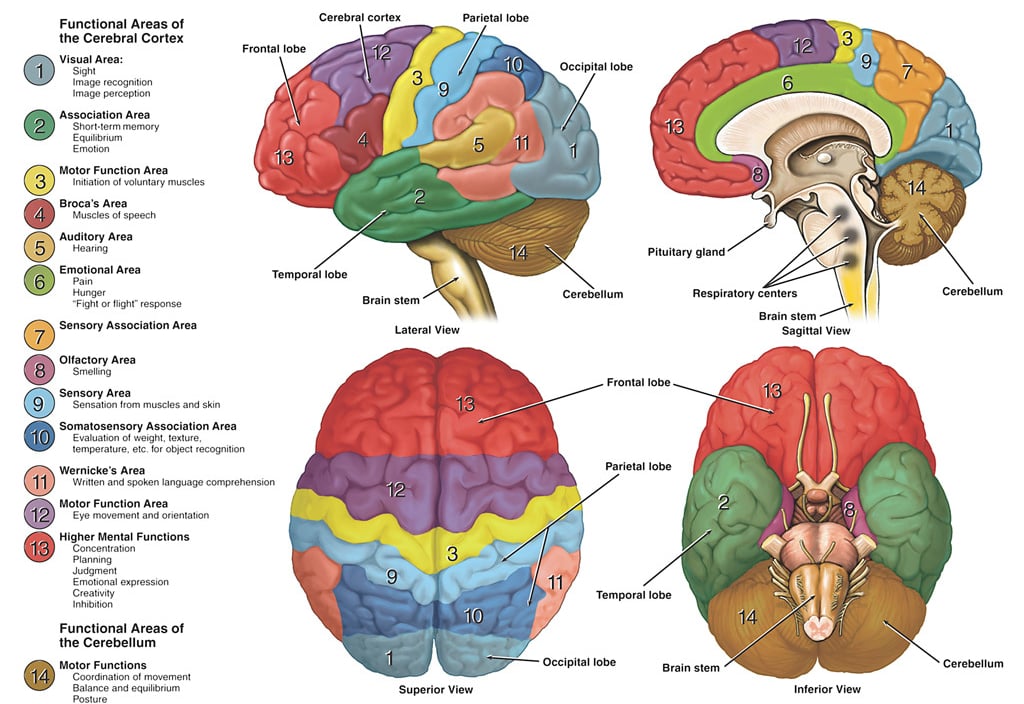

Picture source: Kayt Sukel, Dana Foundation 2019
As you can see the Cerebral Cortex is responsible for so many different areas of our functioning, from our senses to movement to language. This also helps to provide a visual to why different injuries to the brain will result in different symptoms depending on where that injury has occurred.
The next structure is the Thalamus. The Thalamus is two oval masses that are connected by a bridge like structure. The oval shaped structures contain nerve cell bodies that sort information relating to what we see, hear, touch (including temperature, pain and pressure) and taste and provide that information to the cerebral cortex. Nerve impulses for voluntary movement are also initiated here.
The next structure is the Hypothalamus. The hypothalamus is a small structure that is responsible for keeping you in a state of homeostasis. It also controls heart rate, blood pressure, body temperature, feeling full after eating and bladder contraction, just to name a few of its important functions. The Hypothalamus stimulates smooth muscle and receives sensory impulses from smooth muscles. The Hypothalamus also helps to control and influence hormones and the endocrine system by communicating with the Pituitary Gland and telling it what hormone to secrete and when. The Hypothalamus can also produce a few important hormones including: Dopamine, our feel-good hormone; and Somatostatin, which prevents the secretion of other hormones.
Next up is the Cerebellum. The Cerebellum is responsible for movement and balance, including gait and posture, by. While the Cerebellum is responsible for movement, it doesn't actually initiate muscle contraction, instead it provides information to the spinal cord. It receives information from voluntary muscle movements, muscles, tendons, joints and the Cerebral Cortex. The Cerebellum is divided in to two hemispheres, where the left hemisphere controls the left side of the body, and the right hemisphere controls the right side of the body. The Cerebellum is a folded structure that contains an inner white matter layer, covered with gray matter. The Cerebellum actually contains 80% of the brain's neurons!
The Pituitary Gland. The Pituitary Gland communicates with the Hypothalamus and creates a number of different hormones. This gland uses these hormones to communicate and influence other glands throughout the body in order to perform an array of functions, including ovulation via Follicle Stimulating Hormone (FSH) and Lutenizing Hormone (LH), or milk production via Prolactin. The Pituitary Gland also stimulates the thyroid to produce more thyroid hormones through a hormone known as TSH or Thyroid Stimulating Hormone.
The Pineal Gland produces melatonin which is important for sleep and skin pigmentation. It is controlled by light sensitive neurons which help dictate when to create or wind down melatonin production based on how much light is entering our eyes. Melatonin secretion levels change throughout the 24 hour cycle, however, light exposure can interrupt this cycle and reduce melatonin production. This is why getting morning sunlight and reducing blue light exposure at night is so vital to sleep!
The Amygdala plays an important role in emotional behaviour and learning. The Amygdala is the conditioning centre as it processes stimuli that may be neutral but occurred at the same time as something either rewarding, such as getting pocket money (reward) after doing a chore (neutral), or frightening seeing walking past a fence (neutral) and being aggressively barked at (scary). These events can shape the way we react in the next situation depending on what happened during the neutral event. This is why the Amygdala plays a role in keeping us safe and protected from perceived danger. The Amygdala influences memory, decision-making, attention and how we act in social situations. The Amygdala is also why more emotive memories are more likely to be remembered over less emotive memories.
The Hippocampus is actually an extension of the Cerebral Cortex. The Hippocampus is also involved in learning, memory and emotional behaviour. The Hippocampus is the memory processing system, including memory storage, tying emotions to memories and organizing facts and events of memories. It also is vital for memory recollection and recognition. The Hippocampus is responsible for our navigation, as in, it is how we know how to get places we have previously been or where to find things we store in our houses.
The Brain Stem. The Brain Stem sits at the top of the spinal cord and is made up of three areas: the Midbrain, Pons, Medulla. The Brain Stem controls our unconscious functions such as breathing. Brain stem activity is so vital to life, it is actually tested to determine brain activity, if there is no Brain Stem activity, a person is considered brain dead. The Medulla houses all the nerves that pass through to the brain from the spinal cord. This is where the motor signals from nerve tracts cross over from one side of the body to the other, meaning the right brain controls the left side of the body and the left brain controls the right side of the body. The Medulla also houses nerves responsible for shoulder and head movements, swallowing and saliva production. The Pons is a bridge for the lower Brain Stem and the Midbrain. This connection is where nerve impulses pass to the Cerebellum and touch sensations are passed from the spinal cord to the upper brain centres. The Pons also controls some eye movements, taste and facial expression. The Midbrain is a communication highway for sensory and motor nerve impulses to move between the Pons, spinal cord, Thalamus and Cerebral Cortex. Nerves in the Midbrain are also responsible for some eye movements, pupil and lens movements, and reflexes of the eyes, head and trunk.
Brain signs and symptoms
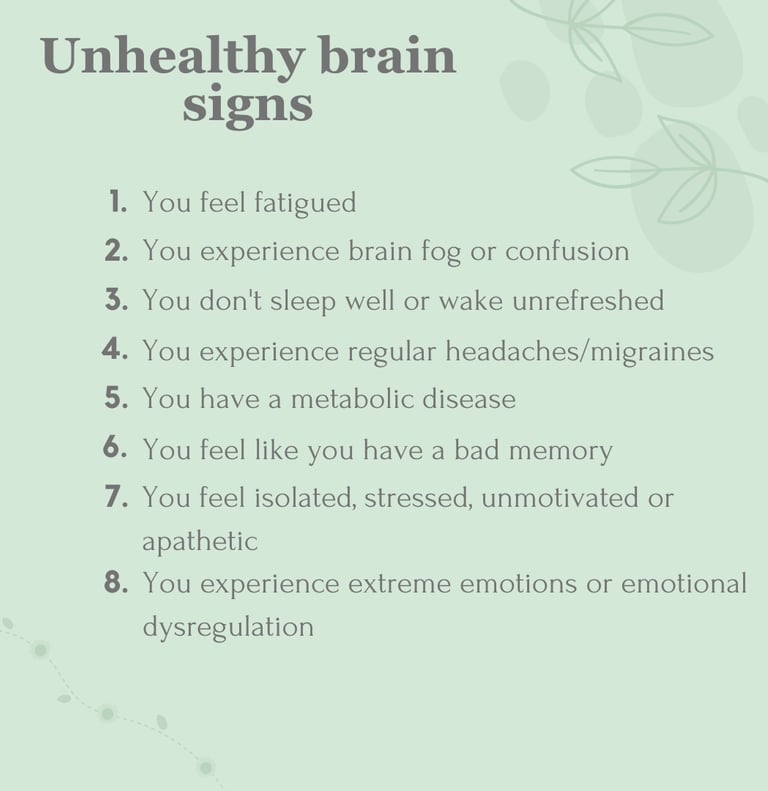

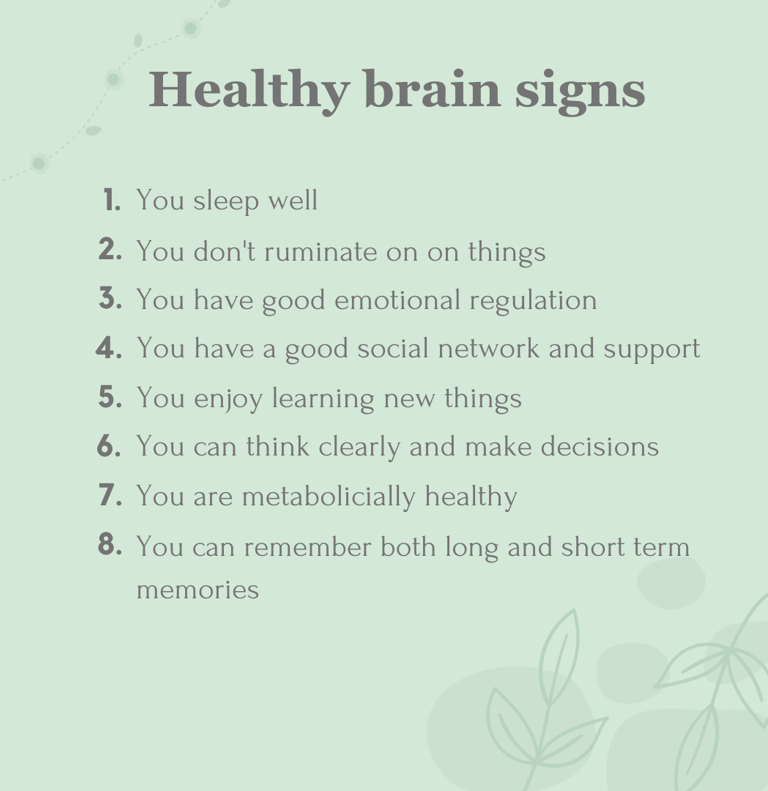

Brain signs and symptoms can range from very mild to quite severe. Not every sign or symptoms points to a serious condition, however, if you experience any of these symptoms more often than not, or these symptoms are severe or new, it is important to have them investigated by a healthcare professional.
Some symptoms that can relate to the brain include:
Fatigue or waking unrefreshed/tired
Headaches or Migraines
Irregular eye movements (Nystagmus)
Brain fog, confusion, inability to think clearly
Tremor, shakiness in limbs
Seizures
Memory loss - long term or short term memory
Heightened emotions, emotional dysregulation or little to no feelings
Unable to regulate temperature - feeling overly cold, superhot
Blurry vision, loss of taste, loss of smell, double vision, spots in vision
No libido
Changes in gait or walking
Changes in speech
Changes in mood or behaviour
Numbness or tingling in the body
Reduced depth perception
Hallucinations
Word blindness
Ataxia - loss of muscle control
Difficulty swallowing
Vertigo
Pupil abnormalities
Insomnia
Increased thirst
Inability to feel full
Amenorrhea - no menstrual cycles
Blood pressure dysregulation - may be high or low
Paralysis
Disorientation
Frequent falls
Clumsiness
Brain diseases & disorders
Not all of the following disease and disorders affect only the brain and many are impacted by other factors other than just the brain.
Alzheimer's Disease
Absence Seizures
ADHD
Autism
Acquired brain injury (ABI) or Traumatic brain injury (TBI)
Amnesia
Brain aneurysm
Brain tumours
Cancer
Concussion
Chronic Traumatic Encephalopathy (CTE)
Dementia
Dyslexia
Encephalitis
Encephalopathy
Epilepsy
Huntington's disease
Hydrocephalus
Meningitis
Mental health disorders
Migraines
Motor Neuron Disease (MND) also known as ALS
Multiple Sclerosis
Parkinson's disease
Seizures
Stroke
Nutrition for brain health
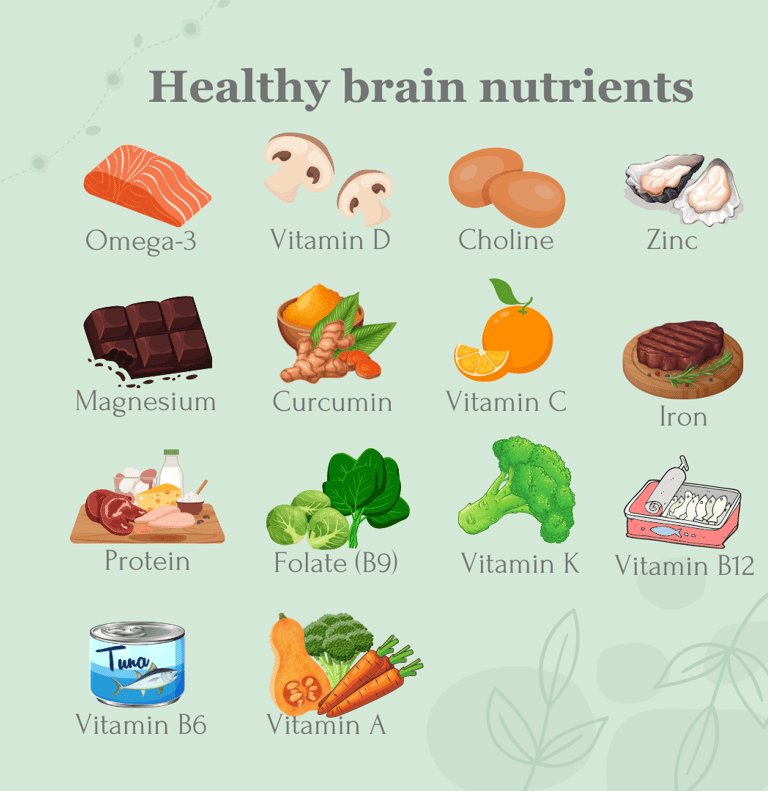

Nutrition can play an important role in optimizing brain health and supporting its function, as well as aiding in symptom management or improvement in some brain conditions. The nutrients and food listed here is general advice for supporting brain health. It is always best practice to include wholefood sources of these foods over supplements. Wholefood sources often have other nutrients that aid in absorption or benefit the recommended nutrients. Supplements should only be taken under the guidance of a qualified health professsional. If you have a specific symptom or condition you would like help with. Please consult a qualified health professional. If you would like to see if I can help you, please either book a discovery call or email me.
Omega-3: Omega-3 fatty acids include EPA, DHA and ALA. DHA is the dominant omega-3 found in the brain. DHA and EPA are found in seafood and fish oils. ALA is found in plant based foods. The body can convert ALA to EPA and DHA, however, it does not do this well so it is important to consume enough EPA and DHA in the diet. Omega-3 can aid with increase blood circulation to the brain, improved cognitive processes, early memory and learning difficulties, reduce inflammation, reduce reactive oxygen species (ROS) and increase neurotransmitter release. Omega-3 fatty acids can inhibit neuronal cell death and be a preventative tool for dementia and cognitive decline. Omega-3 is important for brain cells as it makes up an important component of the cell membrane and assist with communication between brain cells.
Food sources: Salmon, Mackerel, Tuna, Herring, Sardines, Cod Liver Oil, Oysters, Anchovies, Caviar, Flaxseeds (ALA), Chia Seeds (ALA), Walnuts (ALA), Soybeans (ALA). Small amounts from: Organic pasture raised eggs, grass feed meat.
Vitamin D: Vitamin D deficiency has been linked to stroke, cognitive impairment, dementia, mental health conditions and autism. Vitamin D can help to clear amyloid plaques in the brain, regulate calcium homeostasis, improve mood, improve cognition, is anti-inflammatory and an acts as an antioxidant. Vitamin D's calcium homeostasis properities is important for much more than bone health, in some cases of depression, it is theorised that higher levels of neuronal calcium levels play a role in driving depression, and thus optimal Vitamin D levels could play a role in reducing depression symptoms.
Food sources: Cod Liver Oil, Salmon, Tuna, Sardines, Beef Liver, Egg Yolks, Some Mushrooms, Fortified foods.
Choline: Choline is needed to make a key component of cell membranes and a neurotransmitter (acetylcholine) that is vital for memory, mood and anti-inflammatory properties. Choline may be able to increase dopamine receptor quantity, which may improve memory and cognition. There is also some positive research coming out that choline is neuroprotective and assists with neurorecovery, which may be beneficial for those with TBI, concussion and stroke.
Food sources: Beef Liver, Egg Yolks, Chicken Breast, Fish, Shiitake Mushrooms, Potatoes, Broccoli.
Zinc: Zinc deficiency can lead to degeneration, mood and cognitive decline, including poor memory and decreased levels of learning. Zinc is also important for the Pituitary Gland, which is actually the organ with the highest concentration of Zinc. Zinc enhances the function of Pituitary Gland hormones, including growth hormone. Zinc is important for neurogenesis - creating new neurons, and deficiency of zinc can greatly reduce the number of new neurons in the brain. It is important to note, that after some brain injury too much zinc can be neurotoxic, it is important to only supplement with professional advice.
Food sources: Oysters, Beef, Oats, Pumpkin Seeds, Turkey Breast, Legumes, Cashews, Cheese, Dark chocolate.
Magnesium: Magnesium has many important functions in the brain. Magnesium is a precursor for many different events in the brain, including the formation of neural pathways and preventing neuronal death. Magnesium helps to support neuronal plasticity, learning and memory through its role in producing brain derived neurotrophic factor. Magnesium deficiency is linked to chronic low-grade inflammation, neuroinflammation and neurodegeneration, which can increase the risks of developing a brain disease or disorder such as Alzheimer's disease and Parkinson's disease.
Food sources: Pumpkin Seeds, Chia Seeds, Almonds, Boiled Spinach, Cashews, Dark Chocolate, Cacao Powder, Avocado.
Curcumin: Curcumin is a flavonoid found in tumeric. It is well known for its anti-inflammatory, antioxidant and anti-cancer properties. In the brain, curcumin has shown to be protective of the blood brain barrier, reduce ROS, reduce pro-inflammatory cytokines and neuronal death. Due to curcumins action within the brain and it being neuroprotective, it may be useful in a number of brain disorders and diseases, such as migraines, early in brain injuries, Alzheimer's Disease, Multiple Sclerosis and Epilepsy.
Vitamin C: Vitamin C is an important antioxidant with the brain having the highest concentration of Vitamin C of all the organs in the body. Vitamin C supports the brain via its antioxidant properties, regenerating Vitamin E, neurotransmitter production and mood and cognitive enhancements if there was Vitamin C deficiency.
Food sources: Kakadu Plums, Capsicum, Guava, Rockmelon, Kiwi Fruit, Kale, Papaya, Broccoli, Strawberries and Oranges.
Iron: Iron is a vital nutrient for many of the body's processes, thus it is no surprise that iron deficiency or overload has consequences for the brain. Iron homeostasis is vital for brain functioning. Alzheimer's Disease and Parkinson's Disease can be impacted by iron overload which can lead to confusion, depression and mental decline symptoms. In cases of deficiency, iron can improve neurogenesis, neurotransmitter synthesis, cognition and social behaviour. Heme iron is more bioavailable for the body. Non-Heme iron is absorbed at a lesser rate.
Food sources: Chicken Livers (Heme), Beef Livers (Heme), Red Meat (Heme), Dark Chocolate (Non-Heme), Oysters (Heme), Mussels (Heme), Pumpkin Seeds (Non-Heme), Legumes (Non-Heme), Broccoli (Non-Heme).
Protein: Protein is made up of amino acids. Amino acids are vital for many bodily processes and are incredibly important for brain health and functioning. Amino acids are required for neurotransmitter production, which assists with both cognition and mood. Including more protein in your diet, by even replacing 5% of carbohydrates with either animal or plant sources of protein, can lower the risk of developing dementia and protective against cognitive decline.
Food sources: Red Meat, Seafood, Poultry, Legumes, Eggs, Dairy, Nuts and Seeds
Folate, Vitamin B12 & Vitamin B6: One of Folate and Vitamin B12's critical roles in brain health is its role in the production of a universal methyl donor S-adenosylmethionine (SAMe), which is needed for the creation of neurotransmitters. Folate, Vitamin B6 and Vitamin B12 can help to clear homocysteine via its role in the methylation cycle. This is important as high levels of homocysteine is linked with cognitive dysfunction, increased risk for dementia, stroke and heart disease, and mood changes. It is important to note that folate can mask a Vitamin B12 deficiency. Vitamin B6 is needed for neurotransmitter production, specifically the production of serotonin, noradrenaline, adrenaline and GABA. Prioritizing optimal levels of B vitamins in the first 1000 days of life can set an infant up for better cognitive health for life. Correcting B vitamin deficiencies in adults and the elderly can help reduce homocysteine levels and improve cognition and mood.
Food sources Folate: Beef Liver, Boiled Spinach, Rice, Asparagus, Brussel Sprouts, Romaine Lettuce, Avocado, Broccoli and Kidney Beans.
Food sources B12: Beef Liver, Clams, Nutritional Yeast, Salmon, Tuna, Beef, Milk, Yoghurt, Cheese, Eggs and Turkey.
Food sources B6: Chickpeas, Beef Liver, Tuna, Salmon, Chicken Breast, Potatoes, Turkey, Banana and Beef.
Vitamin K: Vitamin K is important for preventing cognitive decline and may be protective against Alzheimer's Disease. Vitamin K can help prevent Aβ-induced cell death, preserving brain cells. Aβ peptides are a key component of Alzheimer's Disease and result in neuronal death. Vitamin K is also important to activate a protein known as Protein S, which helps to improve cerebral blood flow post stroke.
Food sources: Cooked Kale, Cooked Mustard Greens, Swiss Chard, Cooked Collard Greens, Natto, Spinach, Cooked Broccoli and Beef Liver.
Vitamin A: Vitamin A is converted to Retinoic Acid (RA) and is very important for brain functioning and health. RA is needed for synaptic plasticity which is involved in learning and memory. Vitamin A deficiency reduces cell signalling and can result in the deterioration of hippocampal plasticity and function. This can accelerate age related cognitive decline, however, this may be able to be reversed when Vitamin A levels normalize. It's important to note that plant sources of vitamin A are poorly converted into retinol by the body, they are still an incredibly important addition to the diet though.
Food sources: Beef Liver, Sweet Potato, Carrots, Lamb Liver, Cod Liver Oil, Salmon, Butter, Eggs and Whole Milk.
While these nutrients are brilliant in supporting brain health and functioning, it is important to eat a balanced diet. If you are wanting to support both your brain health and overall health, it is also important to limit processed, sugary foods and foods high in trans fats as these negatively impact insulin and metabolic function, produce advanced glycation end-products (AGEs), and increase inflammation levels throughout the body.
Lifestyle for brain health
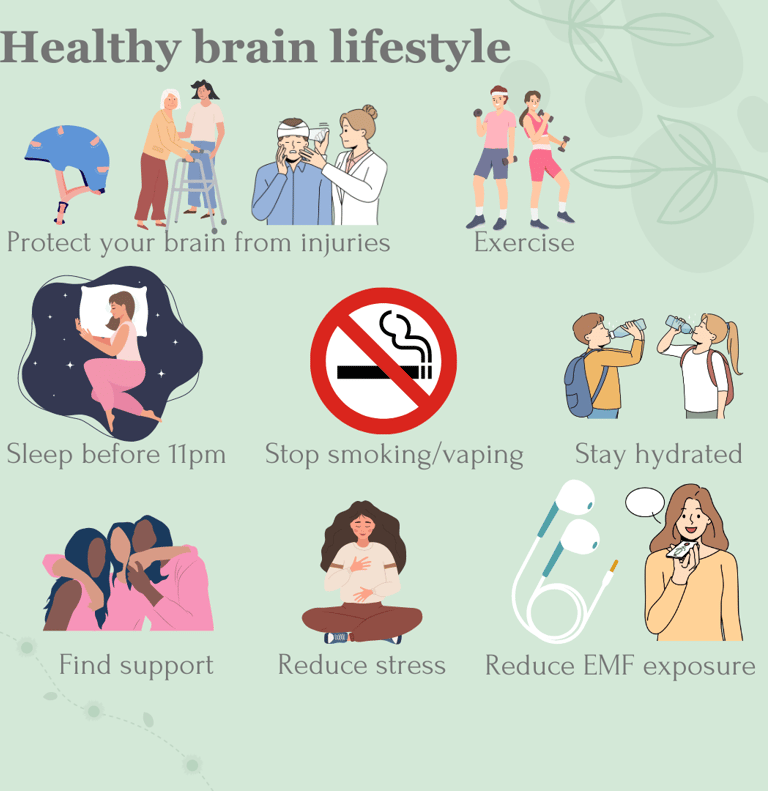

Like nutrition, lifestyle factors also greatly contribute to your brain health and functioning. These lifestyle tips can take some time to implement and create the habit, so go slowly and implement the ones that work best for you or feel achievable at the moment. This is not an exhaustive list of lifestyle habits to support brain health, but it is a good place to start.
Protect your brain from injuries: This one is pretty straight forward but one too many people ignore. The best way to prevent ABI or TBIs is by protecting your head where possible. This includes wearing a helmet when you are on a bike, scooter, rollerblades, or any other activity that could lead to a fall from a height or speed. Wearing a helmet is not a guarantee that you will not suffer an ABI or TBI if you had an accident, however, it does protect you better than not wearing one at all. I promise you are not too cool for a helmet, protecting your brain is so important. Protecting your brain also involves preventing falls, while this is more common for the elderly, fall risk should be assessed and prevented for everyone. Another important aspect is to follow proper guidelines for concussion management and recovery. It is important to let the brain recover properly after a head injury, and even though you may feel better, you should follow the recovery management plan given to you by a doctor. On this note, it is important to have head injuries assessed by a doctor to check for concussion or skull fractures.
Exercise: Exercise impacts brain health in a number of ways. Exercises promotes metabolic health which can help protect the brain from inflammation and promote neurogenesis. Exercise can have positive effects on the brain by promoting synaptic plasticity which improves learning and memory, reducing age-related decline, improves mood and mental health. Exercise is also neuroprotective, reducing brain injury and delaying and reducing decline in neurodegenerative diseases. Exercise increases BDNF, which is important for brain function - particularly the hippocampus, reducing depression, learning and memory. Try different exercise types and see which ones you like. Forced exercise has benefits but voluntary exercise shows greater impacts on brain health. Doing a type of exercise you enjoy has more favourable outcomes!
Sleep before 11pm: Sleep is vital for brain health. While we sleep our brain is being cleaned out and detoxed by our glymphatic system. The glymphatic system is similar to the lymphatic system and is responsible for removing waste products from the brain while providing the brain with energy and nutrients. The glymphatic system is most active during delta-wave sleep or deep sleep. Deep sleep occurs at greater levels earlier in the night. It is important to go to sleep before 11pm as after midnight, deep sleep occurs the most during the first half of the night. As the sleep cycles continue, deep sleep stages get shorter and shorter. Not getting enough deep sleep or having glymphatic system dysfunction can lead to the build up of waste products in the brain. This can lead to headaches, brain fog, and an increased risk of Dementia or Alzheimer's Disease.
Stop smoking or vaping: Smoking has a number of health implications that are quite well known. Its implications on brain health include increased risk of stroke, reduced cognitive function, higher levels of inflammation, thinner cortical thickness - which is associated with reduced attention, visual memory and increased depression. Vaping a current trend that both adults and adolescents have taken up. Many people, especially teenagers and young adults, believe vaping is a safer alternative to smoking. While there are limited studies on vaping and the health effects, the emerging research suggests that vaping e-cigarettes, with nicotine or not, still has both general health and brain health implications. Some of the chemicals found in some vapes include: acetone, acrolein (herbicide), pulegone (insecticide), formaldehyde and heavy metals. Nicotine can lead to increased emotional dysregulation, drug abuse, inattention and reduced memory and learning ability. While the sale of nicotine vapes is illegal in Australia without a prescription, many places are still selling them and many "non-nicotine" vapes actually still contain nicotine. Nicotine can also disrupt the way the brain forms new synapses. This is particularly detrimental for anyone under 25 years old as the brain is still developing and typically builds new synapses quicker. It took years for the long term health consequences of smoking to be researched and the findings to be public health advice. While we don't know the long term health consequences of vaping, the current research is not suggesting they are any better on health than smoking cigarettes. Instead of continuing this habit and waiting years to find out how toxic they are, it is best to be proactive and quit now.
Stay hydrated: We all know that drinking enough water and being hydrated is important, but do you know how it impacts your brain? Your brain is made up of 75% water and therefore is impacted by even mild dehydration. Dehydration can reduce cognitive functioning by disrupting neurotransmitter system and reduce blood flow to some areas of the brain. Dehydration also disrupts homeostasis and may make you feel tired or hungry when you are in fact just thirsty. Being dehydrated also increase cortisol level (stress hormone) while rehydration reduces cortisol levels. Brain impacts of dehydration can be seen with as little as 1% dehydration and these signs worsen with each percentage increase of dehydration. These symptoms worsen again if dehydration is occurring in a hot or dry environment.
Find support: Connecting with people we love, trust, connect with and find supportive can make us feel alive and all warm inside, it is also really beneficial for our brains! Social relationships assist with brain health through cognitive resilience which helps prevent cognitive decline, improve mood, reduce stress impacts, and reduced Dementia and Alzheimer's Disease risk. So catch up with the people you love and have a chat. Support can look as simple as being listened to or listening to someone. So try it out today and boost your brain health as well as the brain health of those you love!
Reduce stress: I am sure everyone has heard how beneficial reducing stress is for every part of your health and life. Stress was designed to keep us safe originally, like if we were being chased by a lion and needed to get away quickly, our stress response would kick in and hopefully get us to safety quickly. Once that event is over, our cortisol levels return to normal. So previously, stressful events did not occur everyday or constantly throughout the day. However, our current situations look quite different and the things we perceive as stressful lead us to being in a consistent state of stress. How many people are going to bed thinking about everything they need to get done the next day. Stress. You wake up and immediately check your phone to THAT email, message or missed call. Stress. Maybe you are running slightly late so you skip breakfast. Stress. Someone cuts you off in traffic. Stress. Work deadlines. Stress. You come home and have to cook dinner, clean and prepare all again for the next day. Stress. This is a lot of peoples everyday, and the stress only compounds if you have a partner, children or pets. Not all stress is avoidable, but how we manage our stress can make a major difference to our health. Management of stress could be a whole post in itself, and it is going to look different to everyone so you will have to find some ways you find helpful in reducing your stress and re-establishing balance when you find yourself getting stressed. Stress impacts the brain in many ways from reducing memory to anxiety to loss of attention to increasing inflammation. Chronic stress can actually impact the activity levels in parts of the brain. For example, chronic stress leads to less activity in the pre-frontal cortex but more activity in the amygdala due to its role in survival and safety.
Reduce EMF exposure: EMFs consist of two categories: Extremely low frequency = ELFs (3-3000 Hz), which are radiofrequencies and powerlines; and Radiofrequency = RFs (30kHz to 300GHz), which are things like mobile phones, Wi-Fi, 5G and wireless devices. Both ELFs and RFs are both considered to be possible human carcinogens. Everyone should aim to reduce EMF exposure but it is of particular importance for children as their nervous system is still developing and is able to conduct more and absorb more EMFs than an adult. Children's skull thickness is significantly thinner than adults as well. At 5 years old, the skull thickness is 0.5mm and 1mm at 10 years old, while an adult's is 2mm. RF-EMF exposure may alter the blood-brain barrier permeability, damage neurons, increase oxidative stress and alter epigenetics. EMF exposure can also lead to headaches, sleep disruption, disrupted neurotransmitters, EEG changes and mood changes. EMF exposure and its impacts on health is a growing area of research, it is important to be proactive in preventing ill health rather than reactive later on. Some ways to help reduce EMF exposure to the brain include:
Using speaker phone when using a mobile phone
Using wired headphones instead of wireless
Keep your phone in another room while you sleep or leave on the other side of the room
Keep Wi-Fi routers away from heavy traffic areas or out of the bedroom/away from the bed
If you need to talk on the phone with it to your ear, alternate sides frequently
This advice is general in nature and is intended for informational purposes only. This advice does not consider your personal circumstances and should not be used as a substitute to personal professional medical advice. If you are concerned about any signs or symptoms you are experiencing, please see a qualified health professional. If you would like personal nutritional and lifestyle advice, please book an appointment. If you choose to rely on any information provided on this site, you do so solely at your own risk.
References
https://www.healthdirect.gov.au/brain-diseases-disorders-and-injuries
https://www.healthline.com/nutrition/best-foods-high-in-zinc#TOC_TITLE_HDR_12
https://bmcpsychiatry.biomedcentral.com/articles/10.1186/s12888-020-02730-w
https://www.healthline.com/nutrition/vitamin-c-foods#TOC_TITLE_HDR_20
https://www.health.harvard.edu/mind-and-mood/protein-intake-associated-with-less-cognitive-decline
https://www.hsph.harvard.edu/nutritionsource/what-should-you-eat/protein/
https://ods.od.nih.gov/factsheets/VitaminB6-HealthProfessional/
https://www.healthline.com/nutrition/foods-high-in-vitamin-k#TOC_TITLE_HDR_2
https://www.annualreviews.org/doi/abs/10.1146/annurev-nutr-122319-034227
https://www.healthline.com/nutrition/foods-high-in-vitamin-a#vegetables
https://ods.od.nih.gov/factsheets/VitaminA-HealthProfessional/
https://www.health.nsw.gov.au/tobacco/Pages/vaping-evidence-summary.aspx
https://systematicreviewsjournal.biomedcentral.com/articles/10.1186/s13643-017-0632-2
https://www.health.harvard.edu/mind-and-mood/protect-your-brain-from-stress
https://www.e-cep.org/journal/view.php?doi=10.3345/cep.2019.01494
https://nopr.niscpr.res.in/bitstream/123456789/16123/1/IJEB%2051%283%29%20187-200.pdf


